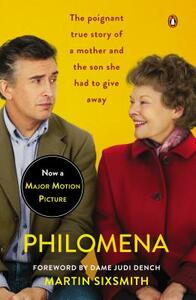You need to sign in or sign up before continuing.
Take a photo of a barcode or cover
217 reviews for:
Philomena (Movie Tie-In): A Mother, Her Son, and a Fifty-Year Search
Martin Sixsmith
217 reviews for:
Philomena (Movie Tie-In): A Mother, Her Son, and a Fifty-Year Search
Martin Sixsmith
I really, really appreciated this book but can only give it 3 stars based off of reviews I've read for it. Many people featured in this exposé have since tried to rebuke various details and conversations. That said, Philomena is still an emotional and turbulent read and well worth it. Despite the inaccuracies, the fifth of the book that features Philomena herself shakes you to your core. If you choose to tackle this novel, read it as an artistic representation of a cheated mother and son; the message will remain just as powerful and stirring.
This is an excellent book. Very enlightening on so many levels about a terrible persecution of women through so called religion and the long term consequences. It was heartbreaking and heartwarming.
This was our Book Club read for the month (or few months, because we didn't manage to get together for a while!). Most people will at least know part of the story from watching or hearing about the recent film based on this book's events, but as a quick summary, it follows the life of Michael Hess, originally Anthony Lee, son of Philmena Lee, a young Irish woman who fell pregnant in the early 50s, gave birth to her son and looked after him until he was a toddler in a convent, before being forced into giving him up for adoption to a family in America. While the title seems to focus on Philomena, despite the very beginning and end of the book, she has very little part in the majority of the story.
This book is different to a lot I read as it is a true story, although it has to be mentioned that the events and conversations in the book are fictionalised to an extent, as you can imagine, there was a lot of secrecy surrounding the convents dealing in this kind of adoption. As such, it's difficult to review, being half way between fiction and non fiction.
I most enjoyed reading the beginning to middle of this book, which leads us through Michael's childhood and into a struggling young adult. It's not that the rest wasn't good, it's just that there was a lot of focus on American politics at the time, of which I know very little, so there were parts I felt I could have understand a lot better had I known what was going on. Michael grows up in a family in America with his 'sister', another little girl from the convent who was adopted with him, and his life is an almost constant struggle from then onwards. It deals with concepts such as the government's homophobia and Michael trying to understand and finally accept what's going on in his head, why he isn't 'normal' compared to everyone else's standards, as well as not having the identity he craves from not knowing or clearly remembering his birth mother.
It was a good read, and very eye opening to what was going on at the time. I'd heard about this sort of thing before, but never thought too much about it - for example, the mothers at the convents are coerced into giving up their children, the children are taken away 'legally' since the mother has signed a form, but their details are very sparsely recorded, and it's almost impossible for them to trace one another. I still haven't seen the film, but I would recommend reading the book first (as I would with most film adaptations) - it's a fascinating topic and time period, both in Ireland and America.
This book is different to a lot I read as it is a true story, although it has to be mentioned that the events and conversations in the book are fictionalised to an extent, as you can imagine, there was a lot of secrecy surrounding the convents dealing in this kind of adoption. As such, it's difficult to review, being half way between fiction and non fiction.
I most enjoyed reading the beginning to middle of this book, which leads us through Michael's childhood and into a struggling young adult. It's not that the rest wasn't good, it's just that there was a lot of focus on American politics at the time, of which I know very little, so there were parts I felt I could have understand a lot better had I known what was going on. Michael grows up in a family in America with his 'sister', another little girl from the convent who was adopted with him, and his life is an almost constant struggle from then onwards. It deals with concepts such as the government's homophobia and Michael trying to understand and finally accept what's going on in his head, why he isn't 'normal' compared to everyone else's standards, as well as not having the identity he craves from not knowing or clearly remembering his birth mother.
It was a good read, and very eye opening to what was going on at the time. I'd heard about this sort of thing before, but never thought too much about it - for example, the mothers at the convents are coerced into giving up their children, the children are taken away 'legally' since the mother has signed a form, but their details are very sparsely recorded, and it's almost impossible for them to trace one another. I still haven't seen the film, but I would recommend reading the book first (as I would with most film adaptations) - it's a fascinating topic and time period, both in Ireland and America.
In 1950's Ireland, unmarried mother Philomena Lee was sent to nuns where she gave birth and was later forced work for three years in order to pay them back for her stay. She raised her son, Anthony Lee, during that time but was made to give up when the nuns adopted him out to rich Americans. For decades she tried to find him. Meanwhile, the son she was forced to give up, renamed Michael Hess, grew up and rose to prominence in American politics and was trying to find her as well. This is their story.
I read this because I really enjoyed the movie that is based on this book and I wanted to know more. It was not what I was expecting. While the movie, Philomena focuses on Philomena and her search for her son, this book focuses on the son and his search for her. I thought it was very interesting for the most part, but I felt like the author took a lot of liberties in writing the book. It is written almost like a novel with a great deal of imagined dialogue. I also felt like to author had almost a weird fixation of Michael Hess' sexuality and coming to terms with being a gay man. However, this does not detract from the fact that this story brings to light a sad part of Ireland's past and the injustice that was done to hundreds of unwed mothers. Overall, worth a read.
I read this because I really enjoyed the movie that is based on this book and I wanted to know more. It was not what I was expecting. While the movie, Philomena focuses on Philomena and her search for her son, this book focuses on the son and his search for her. I thought it was very interesting for the most part, but I felt like the author took a lot of liberties in writing the book. It is written almost like a novel with a great deal of imagined dialogue. I also felt like to author had almost a weird fixation of Michael Hess' sexuality and coming to terms with being a gay man. However, this does not detract from the fact that this story brings to light a sad part of Ireland's past and the injustice that was done to hundreds of unwed mothers. Overall, worth a read.
Very fictionalized (see the most popular comment by Susan Kavanagh herself) but still a captivating story intersecting politics, religion, AIDS, all while watching an amazing man grow into himself as American culture drastically changed around him.
I really loved the movie 'Philomena' and decided to give the book a shot. So glad I did. The movie covers about 40 pages of the book; the book digs deep into what life was like growing up as Michael Hess, an adopted boy who was born in Ireland and just wanted to know why his mother gave him up at birth. It's as heartbreaking as you could imagine, but excellent.
One bone of contention - can someone please tell Martin Sixsmith, whose writing on Russia I have read and respect, that America's bicentennial was in 1976, and not 1977. Sheesh. So close to 5 stars out of 5. I give it 4.
One bone of contention - can someone please tell Martin Sixsmith, whose writing on Russia I have read and respect, that America's bicentennial was in 1976, and not 1977. Sheesh. So close to 5 stars out of 5. I give it 4.
Meh -- the title is misleading. The dialogue is made up, people interviewed for the book dispute its accuracy. Issues abound...
I mark this four stars, not because of the writing (which is okay), but because of the story. It's sad/infuriating what happened here, but also that the language used by 1950s priests and nuns about unmarried mothers is the same kinds of things being said today by some U.S. politicians.
I want to know more about the mother here, and I'm assuming that's what the movie based on the book is about.
I want to know more about the mother here, and I'm assuming that's what the movie based on the book is about.
The movie and book are nothing alike. The movie tells the story of a jaded journalist learning forgiveness through his protagonist. The book is really 10% Philomena, 90% Michael Hess. At first the parallels between mother and son are fascinating -- both where punished for their 'sins of the flesh'. But I found that the author was so intent on portraying Michael as a victim that he totally downplayed the horrible, hurtful choices Michael made with his life. Reading the book tainted my affection for the film. I wish I'd stuck with the cinematic version of 'Michael Hess' -- silent and glimpsed in golden-hued flashbacks.





